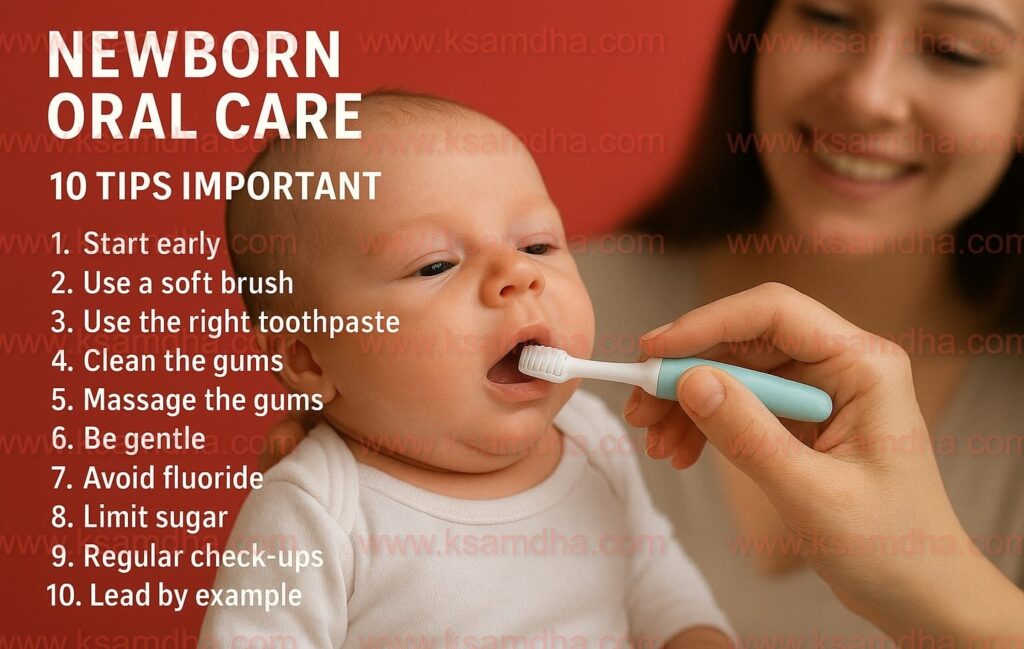Oral Care of New-born Baby | Complete Guide for Parents

Taking care of a newborn baby’s oral health is just as important as caring for their overall health. Many parents believe oral care should start only after the first teeth appear, but in reality, oral hygiene begins right after birth. Good oral care in the early months prevents infections, promotes healthy teeth growth, and reduces future dental problems.
Why Oral Care is Important for Newborn Babies
- Prevents bacterial infections in the mouth.
- Reduces the chances of oral thrush (fungal infection).
- Supports healthy teething when milk teeth appear.
- Prevents bad breath in babies.
- Builds a good oral hygiene habit from an early age.
NOTE – Early oral care means your child will have stronger gums, healthier teeth, and fewer dental issues in the future
When to Start Oral Care for a Newborn
- Many parents ask, “When should we start oral care for our baby?”
The answer is – immediately after birth. - Even before the first tooth erupts (usually around 6 months), parents should clean the baby’s gums, tongue, and mouth gently.
Step-by-Step Guide to Oral Care of Newborn Baby
Taking care of your newborn’s mouth is essential even before their first teeth come in. Early oral care helps prevent infections, keeps the mouth fresh, and prepares your baby for healthy teeth in the future. Follow this step-by-step oral care routine for newborn babies: Wash Your Hands First – Always wash your hands with soap and water before touching your baby’s mouth. This prevents germs from transferring.
1 – Cleaning the Gums
- Use a soft, clean, damp cotton cloth or gauze.
- Wrap it around your finger and gently wipe the baby’s gums twice a day.
- Best times: after feeding and before bedtime.
2 – Cleaning the Tongue
- Sometimes a white coating may appear on the tongue.
- Use a soft, damp cloth to clean gently.
- If the coating is thick or persistent, consult a pediatrician (it may be oral thrush).
3 – Using Finger Brushes
- A silicone baby finger brush is a safe option after 2–3 months.
- It helps in cleaning gums and soothing them during teething.
4 – Hydration and Milk Residue
- Always give a few sips of clean water (only if doctor recommends) after formula feeding.
- For exclusively breastfed babies, wiping gums is enough.
5 – Preparing for First Teeth
- The first tooth usually appears between 6–10 months.
- Start brushing with a soft-bristled baby toothbrush and a rice-grain-sized smear of fluoride toothpaste.
Common Oral Problems in Newborns
1 – Oral Thrush
- Caused by a fungal infection.
- Symptoms: White patches on tongue, gums, or inside cheeks.
- Solution: Consult a pediatrician for antifungal medicine.
2 – Gum Cysts
- Small, harmless cysts on gums (often mistaken for teeth).
- No treatment needed, they disappear naturally.
3 – Milk Coating
- Thin white layer on tongue after feeding.
- Normal, but thick coating may indicate thrush.
4 – Bad Breath
- Usually due to milk residue in the mouth.
- Can be prevented by regular gum cleaning.
Do’s and Don’ts for Newborn Oral Care
✅ Do’s
- Clean gums daily with a soft cloth.
- Use a finger brush after 2–3 months.
- Keep baby bottles and pacifiers sterilized.
- Take your baby for a first dental check-up at 1 year.
❌ Don’ts
- Don’t use toothpaste before the first tooth appears.
- Don’t put baby to sleep with a bottle (risk of baby bottle tooth decay).
- Don’t share spoons with your baby (prevents bacterial transfer).
- Don’t ignore persistent white patches in the mouth.
Tips for Parents to Maintain Baby’s Oral Hygiene
- Establish a routine – clean mouth every morning and night.
- Massage gums gently to improve blood circulation.
- Avoid sugary liquids in bottles.
- Use sterilized teething toys to prevent infections.
- Monitor teething stage carefully and consult a dentist if teeth are delayed.
Role of Parents in Baby’s Oral Health
- Parents are the first oral health caretakers for their newborns. Your efforts in the early months will:
- Build the foundation for a healthy smile.
- Prevent painful dental issues.
- Save expensive dental treatments later.
When to Visit a Pediatric Dentist
- If the baby develops oral thrush.
- If teething is delayed beyond 12 months.
- If there is bleeding from gums.
- For the first dental visit at 12 months.
IMPORTANT OTHERS TOPICS
- Oral care for newborn baby
- Newborn baby dental care
- Infant oral hygiene
- Baby oral care tips
- Oral care for infants
- Baby gum cleaning
- Newborn mouth cleaning
- Oral health for babies
- Baby teeth care guide
- Newborn oral care routine
- How to clean newborn gums
- Baby oral hygiene at home
- Newborn tongue cleaning
- Oral care before baby teeth
- Baby dental health tips
- Preventing oral problems in babies
- Step by step oral care for newborn
- Oral hygiene tips for new parents
- Baby oral health care products
- Newborn oral care in Hindi
- How to take care of newborn baby gums and mouth
- Oral care routine for newborn baby at home
- Importance of oral care in infants
- Best way to clean baby’s mouth after feeding
- Oral care tips for newborns in India

Pingback: HOW TO CONTROL SUGAR LEVEL NATURALLY - www.ksamdha.com